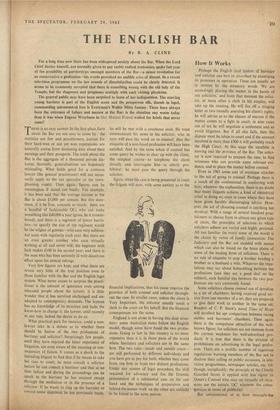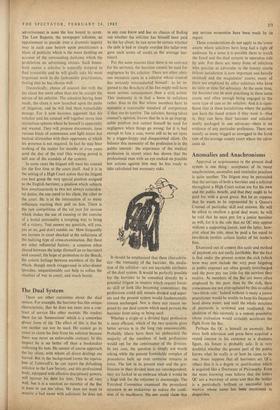How It Works
Perhaps the English dual system of barrister and solicitor can best be described by examining its processes in operation. These are usually set in motion by the minatory words 'We are accordingly placing the matter in the hands of our solicitors,' and from that moment the solici- tor, or more often a clerk in his employ, will take up the running. He will fire off a stinging letter or two roundly asserting his client's rights; he will advise as to the chance of success if the matter comes to a fight in court; in nine cases out of ten he will negotiate a settlement and so avoid litigation. But if all else fails, then the dispute must be taken to court and if the amount involved is more than £300 it will probably reach the High Court. At this stage the squabble is moving into the province of the Bar. The solici- tor is now required to prepare the case, to find witnesses who can provide some relevant evi- dence, and to place the matter before counsel.
Even in 1961 some sort of mystique attaches to the act of going to counsel. Perhaps there is a touch of the confessional in conferring with him; whatever the explanation, there is no doubt that many litigants achieve A kind of obstetrical relief in doing so, even in cases where they have been given harshly discouraging advice. How- ever, the act of choosing counsel is anything but mystical. With a range of several hundred prac- titioners to choose from in almost any given type of claim, the principles of selection to which solicitors adhere are varied and highly personal.
All too familiar (in every sense of the word) is the choice by virtue of family connection. The Judiciary and the Bar are studded with names which can also be found on the brass plates of some of the leading firms of solicitors. There is no rule of etiquette to stop a brother briefing a brother or a husband a wife. Whatever the regu- lations may say about hobnobbing between the professions (and they say a good deal on the subject), such familial ties between the two pro- fessions are very commonly found.
Some solicitors choose counsel out of devotion to a set of chambers; having received good ser- vice from one member of a set, they are prepared to give their work to another in the same set. Readers of C. P. Snow's novel Time of Hope will recollect his apt comparison between racing stables and barristers' chambers. Then again there is the compulsive attraction of the well- known figure; for solicitors are not immune from the current weakness for well-advertised pro- ducts. It is true that there is the strictest of prohibitions on advertising in the legal profes- sion. There are a prolific number of ingenious regulations warning members of the Bar not to disclose their calling on public occasions, in tele- vision programmes, newspaper articles. etc. (al- though, inexplicably, the principle of the Closely Guarded Secret is applied with less rigour to Queen's Counsel who may on virtually all occa- sions use the initials 'QC' whatever the conse- quences in terms of publicity).
But unintentional or at least unsought-for advertisement,is none the less bound to occur. The Law Reports, the newspaper columns, an appointment to preside over a dramatic inquiry may in each case bestow upon practitioners a blaze of publicity which is the more dazzling on account of the surrounding darkness which the prohibition on advertising creates. Such house- hold names a solicitor is naturally tempted to find irresistible and he will gladly take his more important work to the fashionable practitioners, feeling that he has chosen well.
Theoretically, choice of counsel lies with the lay client but more often than not he accepts the advice-of his solicitor. The selection having been made, the client is now launched upon the paths of litigation; and he will find them remarkably strange. For it now becomes apparent that his solicitor and his counsel will together move into mystefious spheres where he himself is apparently not wanted. They will prepare documents, issue various kinds of summonses and fight minor but tactical skirmishes with their opponents at which his presence is not required. In fact he may hear nothing of the matter for months or even years until the day of the trial (this waiting period is still one of the scandals of the system).
In some cases the litigant will meet his counsel for the first time at the court itself. And it is in the setting of a High Court action that the litigant can best grasp the very special position assigned to the English barrister, a position which subjects him simultaneously to two not always coinciden- tal duties, the one owed to his client, the other to the court. He is at the intersection of so many influences exerting their pull on him. There is the raw competition of the rat race for success which makes the use of cunning or the exercise of a brutal personality a tempting way to bring off a victory. 'Just answer my questiOn, will you, yes or no, And don't ramble on.' How frequently arc laymen in court shocked at the unfairness of the bullying type of cross-examination. But there are other influential factors: a common ethos shared between the judge (himself an ex-barrister) and counsel; the hope of promotion to the Bench; the coterie feelings between members of the Bar which, though much exaggerated in after-dinner speeches, unquestionably can help to soften the cruelties of war in court; and much beside.







































 Previous page
Previous page